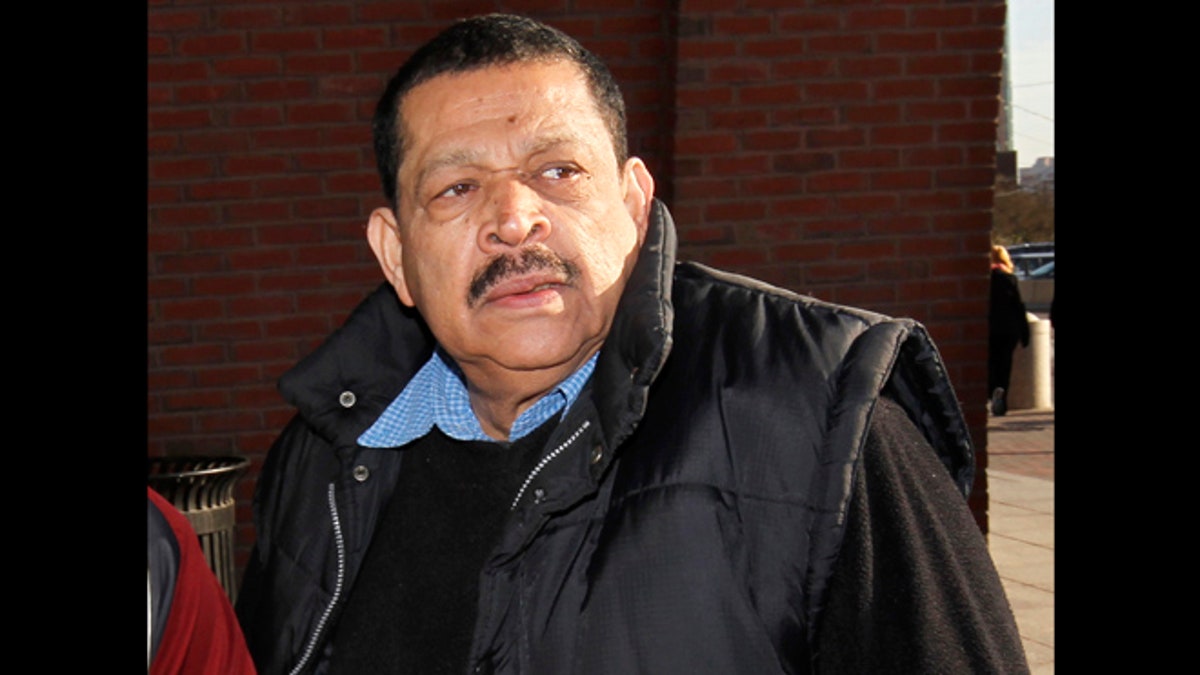
FILE - In this Dec. 19, 2011 file photo, Inocente Orlando Montano, a former Sept. 11, 2012: Salvadoran military officer, arrives at federal court in Boston. Montano, accused of colluding in the 1989 slayings of six Jesuit priests, admitted in federal court in Boston that he lied to U.S. immigration officials, a guilty plea that could allow him to be extradited to Spain for prosecution in the killings. (AP)
BOSTON – A former El Salvadoran military official accused of colluding in the 1989 slayings of six Jesuit priests admitted Tuesday that he lied to U.S. immigration officials, a guilty plea that could allow him to be extradited to Spain for prosecution in the killings.
Inocente Orlando Montano was among 20 Salvadorans indicted in Spain last year for their alleged roles in the killings during El Salvador's 12-year civil war. Montano has denied any involvement in the assassinations.
Montano, now 70, had lived in the Boston area for about a decade when he was arrested last year on immigration charges. Once a high-ranking military official, he said he had been working at a candy factory in the U.S.
Under a deal with prosecutors, Montano pleaded guilty to three counts of immigration fraud and three counts of perjury. He admitted he lied when he applied for temporary protected status, a designation that allows some foreigners to stay in the United States if they are unable to safely return to their own country because of an armed conflict or other reasons.
Government attorneys say sentencing guidelines call for up to two years in prison. Montano's lawyer said he expects to argue at the Dec. 18 sentencing hearing that the guidelines call for less.
Carolyn Patty Blum, senior legal adviser for The Center for Justice and Accountability, a San Francisco-based human rights organization, said Montano was one of the most powerful military officials in El Salvador when the priests were killed.
"We believe he was involved in all the meetings in which the assassination was discussed, planned and ordered," she said said.
In May 2011, a Spanish judge indicted 20 suspects and issued international arrest warrants.
The U.S. government has not indicated whether it would extradite Montano to Spain. A spokeswoman for the Justice Department did not immediately respond to a request for comment Tuesday.
Blum said the group is hoping the government will honor the extradition request while Montano is serving his U.S. prison sentence.
"There is no requirement and/or law for them to wait until he finishes his sentence," she said.
Assistant U.S. Attorney John Capin said Montano lied about his entry date into the United States so he could be eligible to receive temporary protected status.
Montano, who was living in Everett when he was arrested, acknowledged in response to questions from a judge that he was a military officer in El Salvador and held the high position of vice minister for public security from 1989 to 1992. He admitted he lied on immigration forms.
"I wished to stay here to work," he said through an interpreter.
In pleading guilty, Montano "is not acknowledging or making any admissions" to any crimes other than the immigration charges, said his lawyer, Oscar Cruz. He said the plea agreement does not preclude Montano from fighting extradition.
Capin said prosecutors plan to argue at sentencing that Montano's lies were "motivated by his desire to conceal human rights violations he participated in in El Salvador."
U.S. District Judge Douglas Woodlock said he will consider evidence on why Montano came to the United States when he sentences Montano.
"Motive is something that I will consider," Woodlock said.
Miguel Montenegro, director of Salvador's Human Rights Commission, a nongovernmental body that aids victims and investigates allegations of rights violations, said the commission was eager to support anyone trying to prosecute Montano.
"We aren't going to let up under any circumstances," he said. "We support any effort, wherever it comes from, because we believe it's right that people implicated in these types of acts are prosecuted, whether these types of crimes committed by these military men are prosecuted here in our country or in another country."
The guilty pleas reinforce the message that the United States won't ignore alleged foreign crimes by people who seek to live here, said John Morton, director of U.S. Immigration and Customs Enforcement.
"ICE will not allow our shores to be a place of refuge for those who persecute and oppress others," Morton said.

